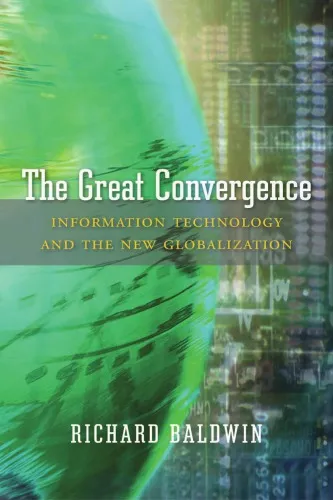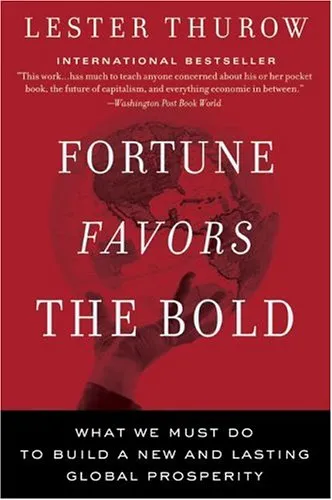The Great Convergence: Information Technology and the New Globalization
4.4
بر اساس نظر کاربران

شما میتونید سوالاتتون در باره کتاب رو از هوش مصنوعیش بعد از ورود بپرسید
هر دانلود یا پرسش از هوش مصنوعی 2 امتیاز لازم دارد، برای بدست آوردن امتیاز رایگان، به صفحه ی راهنمای امتیازات سر بزنید و یک سری کار ارزشمند انجام بدینکتاب های مرتبط:
معرفی کلی کتاب "The Great Convergence: Information Technology and the New Globalization"
کتاب "The Great Convergence: Information Technology and the New Globalization" اثری اجراپذیر و تحلیلی از ریچارد بالدوین است که به تغییرات سریع اقتصادی، نوآوریهای فناوری اطلاعات و تأثیرات آن بر جهانیسازی معاصر میپردازد. این کتاب بر پایه تحقیقات گسترده و دیدگاههای علمی، نشان میدهد چگونه فناوری اطلاعات و ارتباطات (ICT) به موج جدیدی از جهانیسازی تبدیل شدهاند و تفاوتهای عمدهای با دورههای پیشین دارند.
خلاصهای از کتاب
در کتاب "The Great Convergence"، نویسنده توضیح میدهد که چگونه پیشرفتهای فناوری اطلاعات باعث کاهش هزینههای همکاری و ارتباطات بینالمللی شده و همین امر به افزایش شدید نوآوریهای جهانی در سطح بینالمللی منجر شده است. با شکلگیری زیرساختهایی نظیر اینترنت، Cloud Computing و نرمافزارهای پیشرفته، شرکتها دیگر به مرزهای جغرافیایی محدود نمیشوند.
نویسنده تاکید میکند که جهانیسازی دیگر تنها به تبادل کالای فیزیکی محدود نیست، بلکه به انتقال خدمات، اطلاعات و دانش نیز گسترش یافته است. او همچنین به نقش کلیدی تکنولوژی در کاهش فواصل اقتصادی بین کشورها پرداخته و مشخص میکند چرا شرکتها اکنون توانستهاند بخشهای مختلف زنجیره تأمین خود را به کشورهای مختلف منتقل کنند.
یادگیریهای کلیدی از کتاب
- فناوری اطلاعات و نقش آن در کاهش هزینههای ارتباطات و همکاری بینالمللی.
- تغییر مرکز ثقل جهانیسازی از کالا به دادهها و خدمات.
- تأثیرات متقابل اقتصادهای نوظهور و توسعهیافته در عصر جدید.
- تحلیل ساختارهای جدید زنجیره تأمین جهانی که مبتنی بر ICT هستند.
- چگونگی ایجاد فرصتهای شغلی در بازارهای جدید و پیامدهای آن برای اقتصادهای ملی.
جملات معروف از کتاب
"The globalization driven by ICT is not your grandfather’s or even your father’s globalization."
"The cost of moving ideas has fallen drastically, changing the rules of the economic game."
"Technology has rendered distance less relevant, but proximity to knowledge hubs has become key."
چرا این کتاب اهمیت دارد؟
کتاب "The Great Convergence" بهدلیل تحلیل گستردهای که درباره تغییرات ساختاری اقتصاد جهانی در دوران دیجیتال ارائه میدهد، اهمیت زیادی دارد. این کتاب توضیح میدهد که چرا مشاغل و صنایع سنتی باید برای بقا و رشد، به یک مدل دیجیتالیتر و مقیاسپذیرتر نقل مکان کنند. همچنین، ریچارد بالدوین با بررسی روندهای اقتصادی جهانی، تصویری واضح از آینده جهانیسازی ارائه میدهد که میتواند الهامبخش سیاستگذاران، رهبران کسبوکار و محققین باشد.
علاوه بر این، نویسنده بهخوبی نشان میدهد که با حضور فناوریهای نوین، چالشها و فرصتهای جدیدی برای کشورهای در حال توسعه و توسعهیافته ایجاد شده است. کتاب ارزش زیادی برای تصمیمگیرانی دارد که به دنبال درک تعامل بین فناوری و اقتصاد در سطح جهانی هستند.
Introduction to 'The Great Convergence: Information Technology and the New Globalization'
Written by Richard Baldwin, 'The Great Convergence: Information Technology and the New Globalization' offers a profound lens on how technology, particularly information technology, has transformed the global economy. It explores how humanity is experiencing an unprecedented wave of globalization, unlike anything seen before, owing to advancements in communication and digital technology.
This book challenges traditional perspectives on globalization by taking readers beyond the familiar realms of trade and manufacturing, diving into the second unbundling of globalization – the dramatic change in how production and labor are coordinated worldwide. Baldwin explains how these changes have fundamentally altered the global economic landscape, linking economies and people more tightly than ever before. By bridging dense economic theories with real-world examples, the book demonstrates how this transformation affects economies large and small, developed and emerging.
This introduction equips you with an outline of the book and the powerful implications it holds for global trade, societal equity, and the future of work. Read on to explore more about the key themes, takeaways, quotes, and why this book is shaping modern-day dialogue on globalization.
A Detailed Summary of the Book
At the heart of 'The Great Convergence' lies an examination of what Baldwin calls the "second unbundling" of globalization.
In the past, globalization primarily involved the physical movement of goods – the "first unbundling" – driven by reduced shipping costs and innovations such as steam ships and railroads. This phase largely allowed countries to produce goods where it was most cost-effective to do so, further fueling international trade. Baldwin takes this historical perspective and juxtaposes it with the twenty-first century's era of advanced information technology.
With the rise of digital communication tools, production chains are no longer confined to physical proximity. Companies can coordinate across borders in real-time, enabling developed nations to outsource various segments of production to developing economies while still maintaining control and quality standards. Baldwin defines this new phase as the "second unbundling," where the flow of ideas and knowledge-based services complements or even surpasses the flow of goods.
The book illustrates this evolution through numerous case studies, showing how developing countries have been integrated into global production networks. Baldwin also discusses how these changes challenge existing economic policies, as traditional industrial strategies fall short in managing the fluid, borderless exchange of skills and services.
Key Takeaways
- The "Great Convergence" refers to the narrowing economic gap between developed and developing countries, propelled by global production chains.
- Information technology has enabled firms in advanced economies to offshore knowledge-intensive and service-related functions to regions with lower costs.
- The second unbundling of globalization challenges traditional trade policies and demands innovative approaches to address rising inequality and job displacement.
- Countries that remain excluded from global value chains risk economic stagnation, but technology provides new opportunities for inclusion.
- Globalization has moved beyond the physical flow of goods; knowledge, skills, and digital coordination now drive the global economy.
Famous Quotes from the Book
"Advances in communication technology have not only shrunk distances but have essentially obliterated the cost of moving ideas globally."
"The new globalization is not about moving stuff; it's about moving ideas and knowledge. And in today’s world, ideas are more mobile than people."
"For the first time in history, developing nations are finding themselves on the same economic playing field, thanks to breakthroughs in information technology."
Why This Book Matters
Baldwin’s masterpiece is a must-read for policymakers, economists, and anyone interested in understanding the forces shaping modern globalization.
The book provides a seminal framework for understanding how technology transforms global economics. It urges decision-makers to rethink labor policies, trade agreements, and social safety nets in the face of profound technological disruptions. Whether you are a business leader aiming to adapt to shifting trade patterns or an academic curious about globalization's next phase, Baldwin’s insights are invaluable.
Moreover, the book addresses critical questions about societal equity. As the wealth gap grows and automation threatens jobs, Baldwin’s analysis serves as a call to action for governments to embrace inclusive globalization. By connecting economic theory with practical examples, The Great Convergence bridges the gap between understanding and action, offering a roadmap for a more equitable future.
دانلود رایگان مستقیم
شما میتونید سوالاتتون در باره کتاب رو از هوش مصنوعیش بعد از ورود بپرسید
دسترسی به کتابها از طریق پلتفرمهای قانونی و کتابخانههای عمومی نه تنها از حقوق نویسندگان و ناشران حمایت میکند، بلکه به پایداری فرهنگ کتابخوانی نیز کمک میرساند. پیش از دانلود، لحظهای به بررسی این گزینهها فکر کنید.
این کتاب رو در پلتفرم های دیگه ببینید
WorldCat به شما کمک میکنه تا کتاب ها رو در کتابخانه های سراسر دنیا پیدا کنید
امتیازها، نظرات تخصصی و صحبت ها درباره کتاب را در Goodreads ببینید
کتابهای کمیاب یا دست دوم را در AbeBooks پیدا کنید و بخرید
1333
بازدید4.4
امتیاز50
نظر98%
رضایتنظرات:
4.4
بر اساس 0 نظر کاربران
"کیفیت چاپ عالی بود، خیلی راضیام"
Questions & Answers
Ask questions about this book or help others by answering
No questions yet. Be the first to ask!



